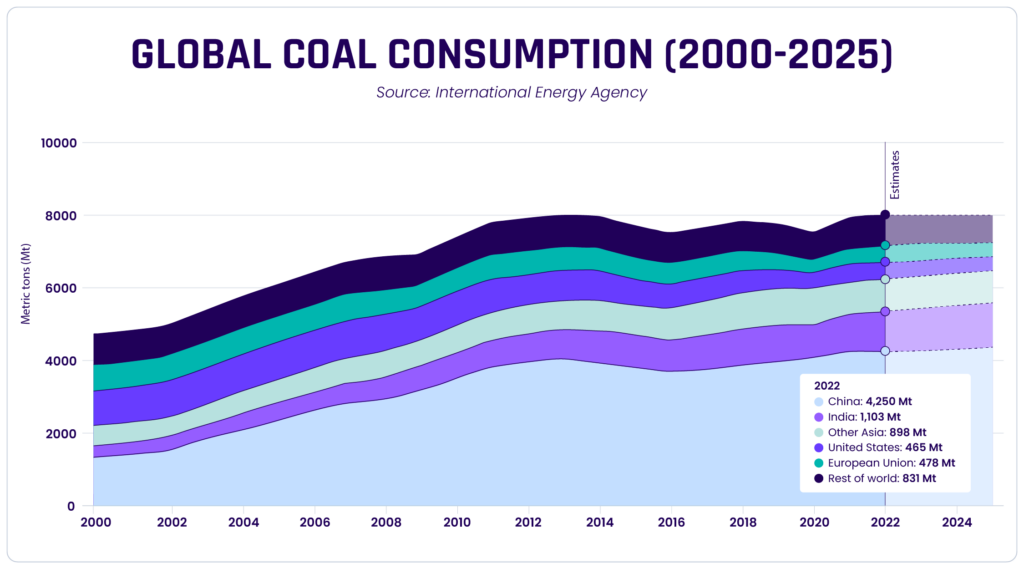
The continued reliance on burning coal to produce energy is undeniably the greatest obstacle to reaching our shared goals for reducing global emissions. With the dependence on coal reaching an all-time high in 2022, rapidly replacing it with cleaner fuel is the front line in the fight against climate change.
The U.S. has provided a model over the past 15 years for reducing emissions by replacing coal with much lower-carbon natural gas. Now, the question is whether that model can be exported to the rest of the world in time to cut emissions and stave off the worst effects of climate change.
While critics of natural gas defer to renewables as the only viable emissions solution, the truth is that the current state of battery storage and transmission infrastructure poses real obstacles to the buildout of renewables. Meanwhile, more power is generated globally with coal than any other fuel source. This persistence of coal, and its resulting emissions, will only continue if we adopt a renewables-or-bust approach.
But we can drastically slash emissions right now if we replace the dirtiest coal-fired power plants worldwide with natural gas. Gas burns far cleaner than coal and is more reliable than renewables, making it the best option to simultaneously achieve energy security, reliability, and emissions reductions. In fact, global power sector emissions would be reduced by 30% if the world’s top 5% worst emitting power plants switched to natural gas. Those emissions savings would increase to nearly 50% if that switch incorporated carbon capture and storage.
Federal policymakers in the U.S. could hold the keys to unleashing the LNG revolution we need. If policies were put in place to allow for increased natural gas production – while working to reduce its carbon footprint further – we could export the U.S.-made solution to lowering greenhouse gas emissions right away.
The Environmental Benefits of Phasing Out Coal With LNG
The U.S. has already demonstrated the climate benefits of natural gas, with 65% of all power generation emission reductions over the past 15 years driven by coal-to-gas-switching. By replicating this solution worldwide through expanding U.S. liquefied natural gas (LNG) exports, we can make the most significant dent in global emissions the world has ever seen.

Paul Bledsoe, a strategic advisor for the Progressive Policy Institute (PPI), says, “Coal to LNG switching provides net GHG reductions, usually between 40-50%, meaning the extent of global emissions reductions from coal displacement will be in part determined by how much U.S. LNG reaches overseas coal-using nations.”
Exporting American Gas to the World
The U.S. became the world’s largest LNG exporter in 2022. Spurred by the war in Ukraine, American gas helped stabilize Europe’s economy after Russia cut off the continent’s primary energy supply. The environmental benefits of these exports were tremendous – not only did they help limit coal growth in Europe, but they also reduced the use of high-methane-leaking Russian gas.
But exporting American gas to Europe is just one part of the solution, as coal usage is more widespread in other markets. China, which had previously been on a path to phase out coal, accounts for 50% of today’s global coal demand and 1/3 of total consumption, while India’s coal use has more thandoubled since 2007.
Doubling LNG Exports and Increasing Domestic Production
According to a study published by PPI, the U.S. will need to double its LNG exports by 2028 to coal-dependent countries to encourage coal-to-gas switching. Doing this also requires increasing domestic production by at least 10% to keep prices low.
The solution is on our doorstep – the U.S. has the supply, but political will for new policies, such as comprehensive permitting reform, is needed to accelerate the development of domestic infrastructure required for increased LNG exports. By enacting policies that encourage the production and export of natural gas, the U.S. can become a global leader in energy security and decarbonization.



